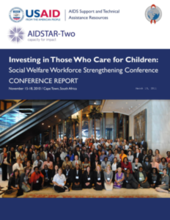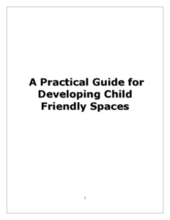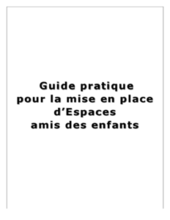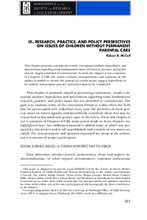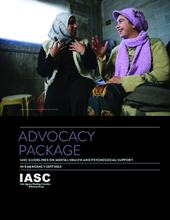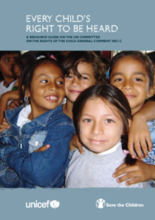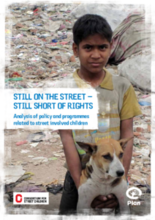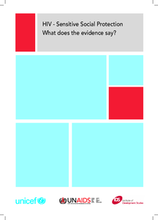Displaying 3861 - 3870 of 4431
This Conference explored a range of workforce development strategies, including strategies for planning, training, and supporting the workforce incorporating lessons learned from Health Systems Strengthening and Human Resources for Health Initiatives as well as other human and institutional capacity building and training efforts.
Guidance for development and programming of child friendly spaces in emergencies.
Si les Principes directeurs du HCR relatifs a la determination de l'intérêt supérieur de l'enfant (2008) reste le guide faisant autorite, le Manuel de Terrain est une source complémentaire d’orientations, qui offre des conseils supplémentaires sur la façon d’exécuter le processus de détermination de l’intérêt supérieur en pratique.
Ce guide est conçu pour aider le personnel et les partenaires de l’UNICEF à mettre en place et à faire fonctionner des Espaces amis des enfants (EAE) dans une situation d'urgence.
This chapter presents conclusions, trends, conceptual analyses, hypotheses, and speculations regarding some fundamental issues of research, practice, and policy that are largely unsettled or controversial, regarding children without permanent parental care.
This Advocacy Package explains what the IASC guidelines are and how they are to be used, highlights the key campaigning activities, key messages for communities, donors, UN Agencies and Non-Governmental organisations, clarifies terminology and provide ideas for country level implementation.
The first ever World report on disability, produced jointly by WHO and the World Bank, suggests that more than a billion people in the world today experience disability. This report provides the best available evidence about what works to overcome barriers to health care, rehabilitation, education, employment, and support services, and to create the environments which will enable people with disabilities to flourish. The report ends with a concrete set of recommended actions for governments and their partners.
This resource guide is based on and elaborates the UN Committee on the Rights of the Child General Comment No. 12, ‘The Right of the Child to be Heard.’ The aim of this handbook is to try to make easier the task of governments in moving that agenda forward.
This report, commissioned by Plan International, and supported by Consortium for Street Children (CSC) through collaboration and information, and written by GCPS, provides an analysis of the situation of street involved children, how their issues are currently addressed within legislative and policy frameworks, and highlights programmatic initiatives being implemented by International and local NGOs. Its aim is to inform and provide suggestions for improved practice by NGOs working with street involved children.
Shows how HIV-sensitive social protection can reduce vulnerability to HIV infection, improve and extend the lives of people living with HIV, and support individuals and households. While not specific to children, the paper includes sections on HIV and Child Protection and HIV and Early Childhood Development.

